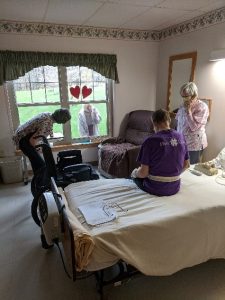 Mr. A, is a retired professor from a state university. He was auto-enrolled in his state’s retiree Medicare Advantage (MA) plan. The plan prospectus states that it covers an unlimited number of days in a skilled nursing facility (SNF).
Mr. A, is a retired professor from a state university. He was auto-enrolled in his state’s retiree Medicare Advantage (MA) plan. The plan prospectus states that it covers an unlimited number of days in a skilled nursing facility (SNF).
An active 73-year old, Mr. A went to his primary care doctor because he was experiencing some unusual discomfort. Within a short time it was determined that Mr. A had pancreatic cancer. He had surgery in January 2020; fortunately, the prognosis for his recovery was good. He was discharged home after a few weeks in the hospital, but within a few hours of being home had a stroke. He returned to the hospital by ambulance. After that hospital stay he was admitted to a skilled nursing facility on February 4th for nursing and multi-disciplinary therapies to care for his post-stroke disabilities and post pancreatic cancer surgery needs.
As a result of his stroke, Mr. A was paralyzed on his left side. He made gains. Within a few weeks, he could speak and swallow again, although not normally, and was able to discontinue use of a feeding tube. The speech pathologist recommended continued therapy to perfect his swallowing, reduce the danger of aspirating, and continue working on his speech. He could move his left arm and leg and had gained strength. He was even able to work with the therapist and a device to begin efforts to possibly walk again. But he needed more therapy to maximize his potential and maintain what he’d gained. Nonetheless, his Medicare Advantage plan issued a notice of Medicare denial after 14 days in the SNF.
The SNF nurses, therapists, and Mr. A’s physician all documented his receipt of care, needs, and progress. His treating physician ordered continued daily nursing and therapy in the SNF. The family successfully appealed with support from the physician and the Center for Medicare Advocacy (the Center). But the MA plan continued to review his case weekly; it issued 7 denials in 9 weeks. With a great deal of help from Mr. A’s doctor and the Center, the family kept successfully appealing, from February 2020 through May 2020.
During this entire time the MA plan asserted that Mr. had reached his “maximum level of practical improvement” and that he could go home. Not only is improvement not a legal standard upon which to deny Medicare coverage, this simply was not true. In fact, Mr. A is now able to use his left arm and hand and swallow normally; his speech is markedly improved, he can transfer from bed to wheelchair with assist, and is beginning to walk with a walker and therapist assistance.
Each time the MA plan denied further Medicare coverage, the so-called “discharge plan” was to teach his wife to use the equipment necessary to help Mr. A out of bed, to help him transfer, and to obtain 24 hour in-home care. This would not meet Mr. A’s health and therapeutic care needs, nor could the family afford 24-hour care. As a practical matter, and as ordered by his attending physician, Mr. A’s care could only be provided in a SNF. This was particularly true beginning mid-March 2020, when the COVID pandemic prohibited Mr. A’s wife from visiting him in the SNF and learning from his nurses and therapists how to provide his care.
An honest review and analysis of the law, medical records, and treating physician’s opinion confirms that Mr. A qualifies for continued Medicare coverage:
- He was an inpatient in a hospital for over three days before entering the SNF;
- His doctor ordered daily skilled care to be provided in the SNF for care related to the conditions for which he was hospitalized;
- He needs, and received, daily skilled nursing and therapies that, as a practical matter, can only be provided in a skilled nursing facility.
The MA plan denials are inappropriate and add unnecessary and harmful stress for Mr. A and his family. Fortunately, a Medical Director at the relevant Medicare Quality Improvement Organization (QIO) that reviews appeals has agreed and overturned each MA plan denial to date.
